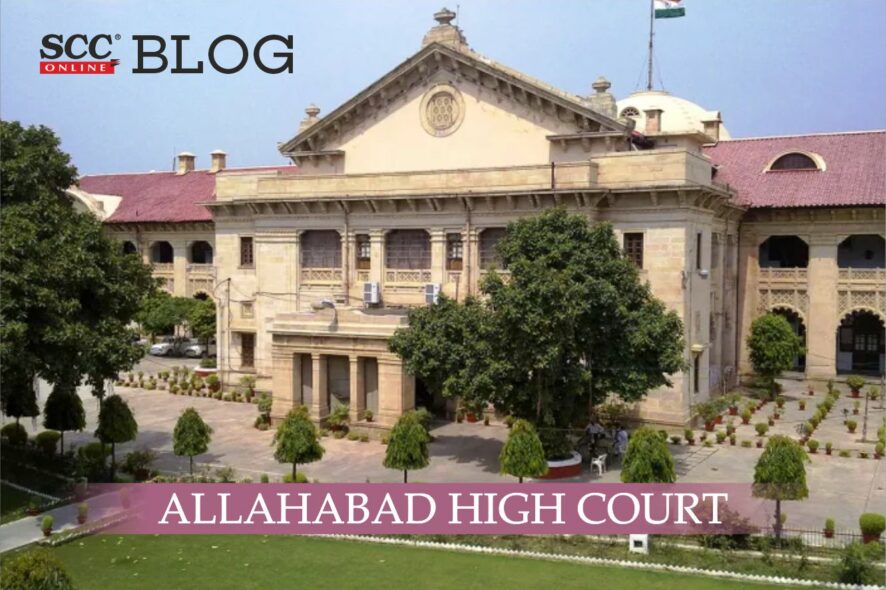Allahabad High Court: In a writ petition filed against Yogi Adityanath questioning his election and continuance as Chief Minister of Uttar Pradesh with effect from 25-09-2022., the division bench of Attau Rahman Masoodi and Om Prakash Shukla, JJ. reiterated that the relief being sought by the petitioner could have been granted in the election petition only. Thus, the Court dismissed the petition and imposed an exemplary cost of Rs. 11,000 on the petitioner for wasting the valuable Court’s time.
The present petition has been filed on the ground that Yogi Adityanath is not qualified to contest the election for the current legislative assembly of Uttar Pradesh due to violation of provisions of Rule 4-A of the Conduct of Election Rules, 1961 (‘Rules, 1961’). The relief being sought by the petitioner is based on an attack on the alleged affidavit filed by Yogi Adityanath, claiming that the affidavit was not as per the provisions of the said rules, thus, his election as a member of the Legislative Assembly was not legal. Consequently, even if, he had been appointed as a Chief Minister of U.P., his continuation cannot be confirmed as per law in view of Article 164(4) of the Constitution, which prescribes that a Minister who for any period of six consecutive months is not a member of the Legislature of the State shall at the expiration of that period cease to be a Minister.
The Court found this petition to be very amusing and said that the petitioner seems to be in a spree of filing this kind of petition as an identical petition praying for the same relief was dismissed, as it was withdrawn. Further, no leave nor any liberty had been sought by the petitioner to file the present petition.
Placing reliance on Direct Recruit Class II Engg. Officers’ Assn. v. State of Maharashtra, (1990) 2 SCC 715, wherein it was held that the principles of res judicata are applicable to writ petitions, the court without testing the present writ petition on the premise of res-judicata, grants the concession of considering the present writ petition.
The Court referred to Section 80 of the Representation of People’s Act, 1951 (‘RPA, 1951’) and said that no election shall be called in question except by an election petition presented in accordance with the provisions of this part. Further, on a deep enquiry it is apparent that the petitioner is drawing the aforesaid analogy by presuming that the election of Yogi Adityanath is not proper, as he couldn’t show a single document which shows that election has been found by any competent authority to be not proper. Moreover, the Court found that the petitioner under the garb of the present petition is seeking to challenge the election of Yogi Adityanath from Gorakhpur Urban Legislative Assembly.
The Court said that such a challenge to the election can be made only by filing an election petition before the Court as per the conditions provided in the Representation of Peoples Act, 1951. Further, any challenge to an election is a statutory right and is available to a person as has been prescribed under the statute only.
The Court took note of the principle articulated in Nazir Ahmad v. King-Emperor, 1936 SCC OnLine PC 41 that “if a statute requires a thing to be done in a particular manner, it should be done in that manner or not at all” and said that the petitioner has not filed the election petition in the present case and has chosen to file the present writ petition, which is not permissible under the statute, thereby trying to do something indirectly which the law prohibits him to do directly.
The Court relied on Krishna Ballabh Prasad Singh v. S.D.O., (1985) 4 SCC 194 wherein it was held that “the bar of clause (b) of Article 329 of the Constitution came into operation after the process of election comes to an end and an election petition alone was maintainable, thus the writ petition cannot be entertained” and on Indrajit Barua v. Election Commission of India, (1985) 4 SCC 722, wherein it was held that “the challenge to the elections to the Assam Legislative Assembly by filing petitions under Article 226 of the Constitution was, therefore, not tenable in law”, thus, the Court reiterated that the relief being sought by the petitioner could have been granted in election petition only.
Further, the Court observed that the petitioner is neither an elector nor a candidate at the election of Gorakhpur Urban Legislative Assembly constituency, from which the Yogi Adityanath stands elected, and said that the present petition is also liable to be rejected as the petitioner does not have any locus for filing the present petition, as according to section 81 RPA, 1951 provides that an election petition may be presented by any elector or any candidate at such election. Therefore, the petitioner fails to fall in any of the categories to make the present petition maintainable.
Moreover, the Court relied on State of W.B. v. Anindya Sundar Das, 2022 SCC OnLine SC 1382 wherein it was observed that “the issue is no longer res integra relating to the settled position, that the writ of quo warranto can be issued only where an appointment has not been made in accordance with the law” and said that the petitioner in the present case has also failed to show from records as to how the appointment or the continuation of Yogi Adityanath as the Chief Minister is not in accordance with law.
[Dr M Ismail Faruqui v. Adityanath, 2022 SCC OnLine All 768, decided on 11-11-2022]
Advocate who appeared in this case :
Counsel for Petitioner:- In Person.
*Apoorva Goel, Editorial Assistant has reported this brief.






